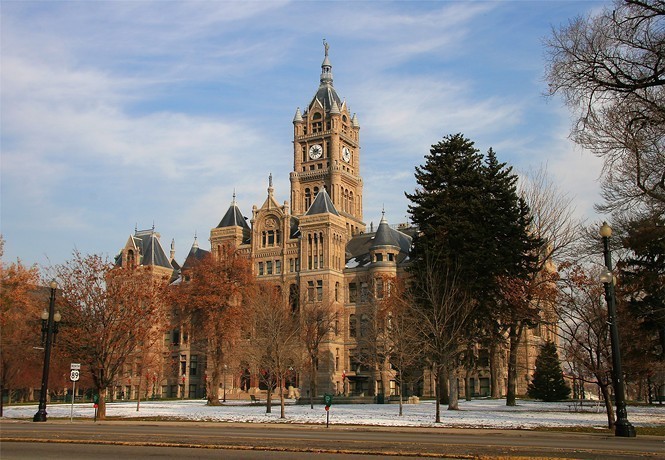Salt Lake City Council declares February Black History Month; approves cost-of-living raise for library employees
Washington Square Dispatch
By Josi HindsThe Salt Lake City Council convened on the evening of Tuesday, Feb. 6, to adopt a ceremonial resolution declaring February as Black History Month and to adopt budget amendments to the 2023-2024 fiscal year. The Council also heard public comments regarding a ceasefire in Gaza and concerns over impact studies regarding the Inland Port Development.
Black History Month
Alongside Mayor Erin Mendenhall, the Council voted to declare February as Black History Month in Salt Lake City.
“It is our honor to acknowledge and celebrate the heritage, perseverance and achievements of Black Americans in our nation’s history,” Councilmember Dan Dugan read from the council’s resolution. “We acknowledge their struggle as an American struggle and at its core reflects upon our society.”
“Thank you, profoundly for this recognition,” said Abby Dizon-Maughan, local NAACP Criminal Justice Division chairperson. “It’s important that we take this time not just to reflect on the contributions that Black individuals have made … but to recognize and reckon with the dark history that accompanies Black history."
Library Funding
The Council voted unanimously to adopt an amendment to the library’s 2023-2024 fiscal year budget. This amendment will allocate roughly $160,000 to the library to cover a 1% increase in the cost of living for all library employees. This amendment also gives the library about $60,000 to hire a new full-time employee for the library’s safety team.
The Council also adopted another budget amendment for the 2023-2024 fiscal year that authorized the release of $500,000 in funds for a temporary sanctioned campground and another $500,000 in funds for police overtime related to the campground’s pilot program.
Gaza Ceasefire
Roughly 50 people spoke during the general comments portion of the meeting to ask the Council to pass a resolution calling for a ceasefire in the Israel-Gaza conflict. This is the fourth straight Council meeting this group has attended to advocate for this resolution.
"I was very hesitant to come here today. I don't know whether our words will make any difference. We've shown up here time after time again and nothing happens,” Aziz Abuzayed told the Council. "Every time we ask you to call for a ceasefire, you just give us this empty rhetoric about wanting to satisfy or not making the other side feel unsafe, but we feel unsafe, we feel unheard.”
Several other commenters expressed similar disappointment in the lack of action taken by the Council.
“I don't know who to go to anymore. It's supposed to be you people and you don't listen,” Erin Lynn told the Council. “What makes you think that we want to go through the correct channels when you can’t even listen to a room full of people saying ‘I think murdering an entire people is bad.’”
Commenters pointed to the high death toll in Gaza, which has surpassed 27,000, as reported by Al Jazeera, and to the brutal videos showing the circumstances of those on the ground in Gaza to emphasize the necessity of a ceasefire.
“We need political courage. We need you guys to go beyond politics and reach out to your community,” said Micheal Valentine, a former mayoral candidate in the 2023 municipal election.
Inland Port
During the general comments section of the meeting, a handful of Salt Lake City residents spoke about the 2022 Interlocal Cooperation Agreement between Salt Lake City and the Utah Inland Port Authority. This agreement was made to help facilitate the development of the Northwest Quadrant of Salt Lake City.
Part of this agreement included a requirement for a traffic study, a human health impact assessment and a community impact study, as was deemed essential by Salt Lake City. The deadline to initiate these studies, Dec. 31, 2023, has passed.
“Local government is the last line of defense for the health and well-being of her residents,” said Dr. Courtney Henley, board member of Utah Physicians for a Healthy Environment. “If Salt Lake City can't muster the will to care for the health of her people, nobody else will.”
Henley urged the Salt Lake City Council to actively advocate for the initiation of these studies.
Katie Papas echoed similar sentiments. She explained the west side is already disproportionately impacted by pollution, which makes these studies even more essential.
“Without the data these studies would provide, what would the referred-to ‘master plan’ be based on, and how would we understand development impacts in order to prevent and mitigate harm?” Papas asked.
According to the Utah Inland Port Authority, the Northwest Quadrant’s placement near major railways and an international airport, as well as between two interstate highways, puts the land in high demand for the expansion of warehouses, distribution centers and manufacturing.
More by Josi Hinds
-
Salt Lake City Council debates new citywide transportation plan, increases fines for unlawful building demolitions
Washington Square Dispatch
- Apr 19, 2024
-
Salt Lake City Council weighs changes to development ordinances after illegal teardown of historic Fifth Ward Meetinghouse facade.
Washington Square Dispatch
- Apr 4, 2024
-
Salt Lake City Council names March 31 Transgender Day of Visibility and expands the Yalecrest Historic District.
Washington Square Dispatch
- Mar 27, 2024
- More »
Latest in News
Readers also liked…
-
Raise a glass for E.L.T Harrison, architect of the Beerhive building on Main
Small Lake City
- Oct 11, 2023




